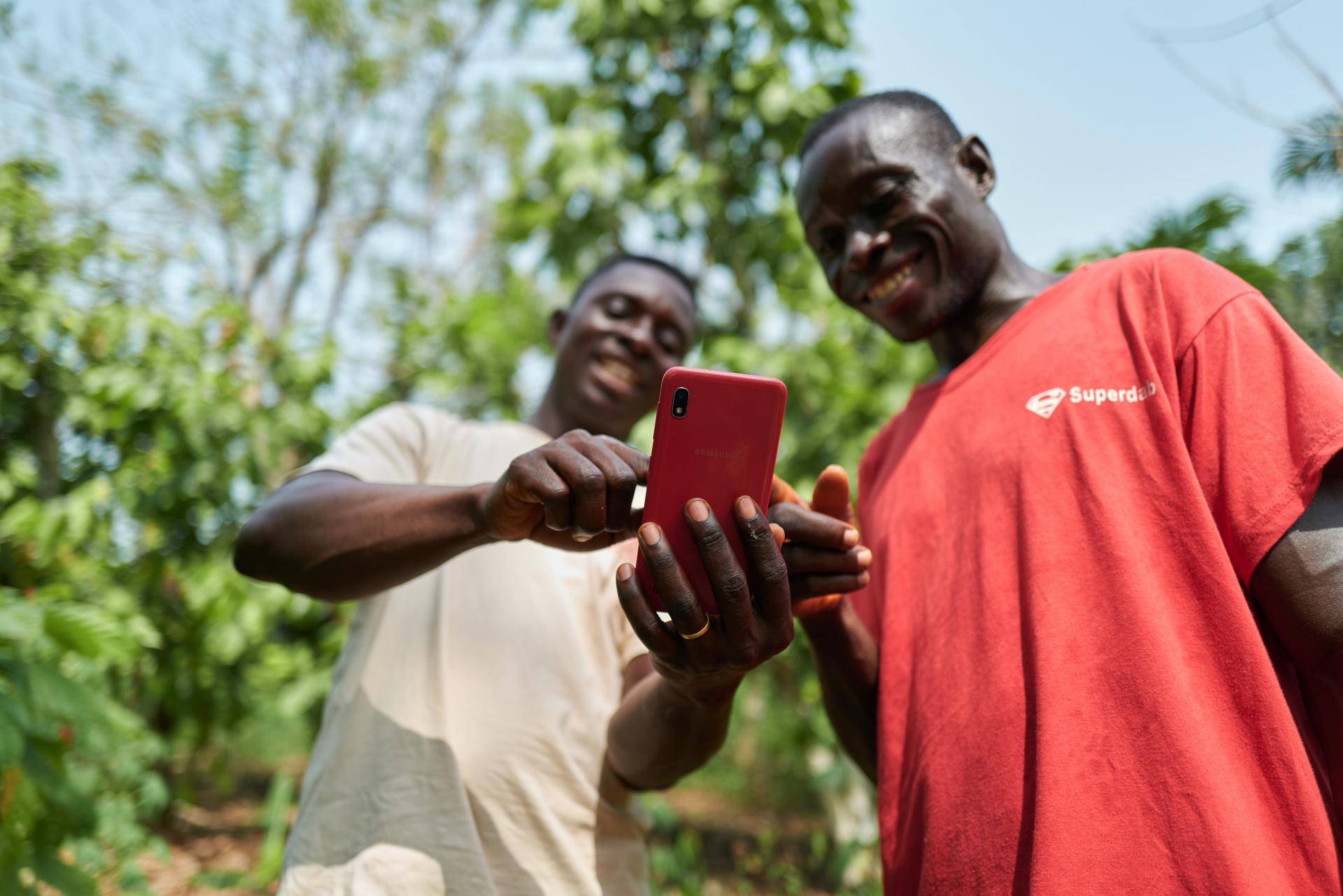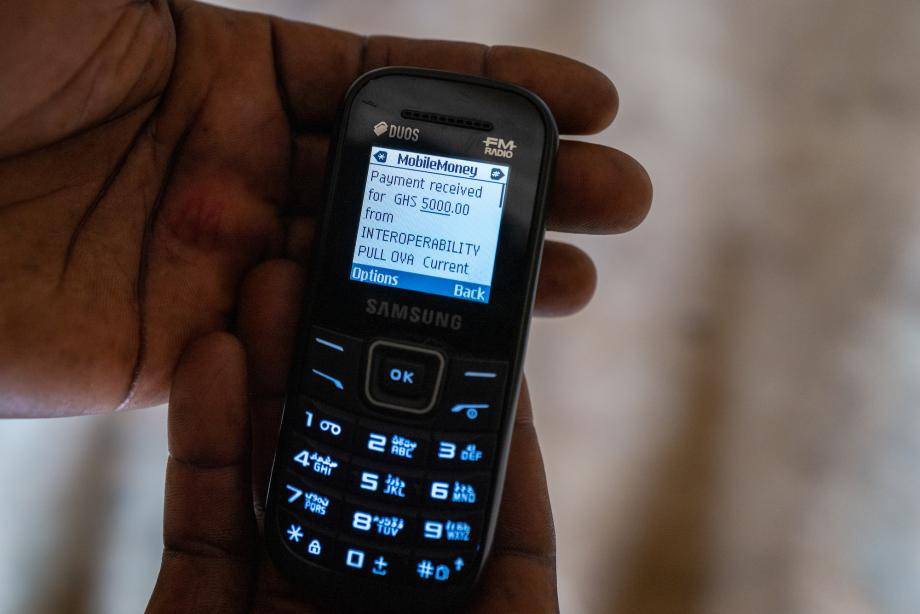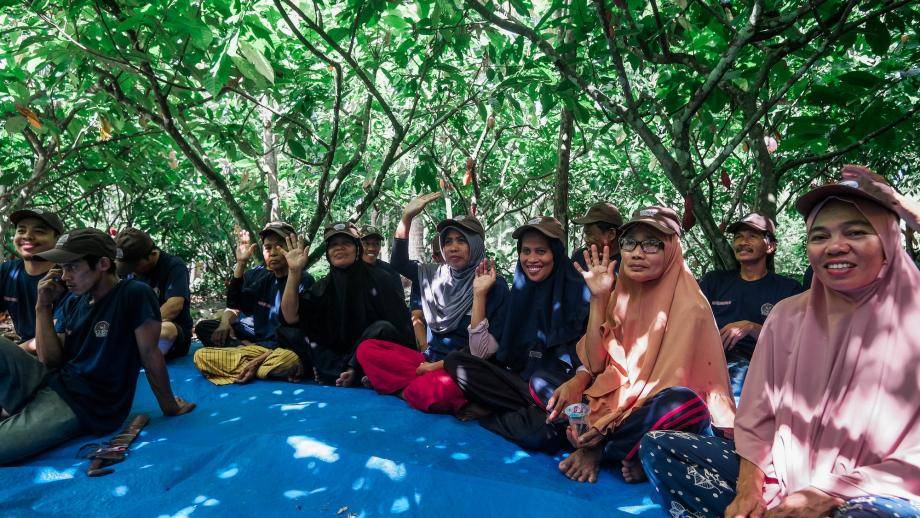How digital payments contribute to sustainable cocoa farming

How digital payments contribute to sustainable cocoa farming

Digitized payment notification on a farmer’s phone
Over the past year, thousands more cocoa farmers within Barry Callebaut’s global supply chain have begun to receive digital cash payments for their beans. Cocoa beans that are part of certified or verified cocoa programs such as Rainforest Alliance or Cocoa Horizons generate additional premiums, and these are now paid digitally to farmers.
Why are digital payments important for sustainable cocoa farming? They are more secure and provide credible records of farmer income. Until recently, cocoa farmers looked forward to their harvests with both excitement and anxiety. Exclusion from formal financial services, limited access to credit, and low financial literacy can result in unpaid bills and lack of income until a cash payment is received. In addition, transporting and delivery of bulk cash payments can be a risky business.
Payment digitization is a key part of Forever Chocolate, our plan to make sustainable chocolate the norm. It supports the financial inclusion of cocoa farmers and secures the traceability and reliability of most cocoa premiums currently paid by our customers. Full transition to digital payments will come in the near future.

For women farmers in particular, digital payments provide greater financial autonomy.
Digital payments - a step towards financial inclusion
Further rolling-out of digital payments is an actionable step towards our goal to lift cocoa farmers out of poverty and supports the professionalization of farming practices. Cocoa farmers have a solid understanding of sustainable agricultural practices, but their main struggle is access to investments in their farms. We focus on providing input support through subsidized soil inputs, planting material, financial support for third-party labor services and additional premiums.
Digital premium payments benefit cocoa farmers by establishing credible income records and accelerating financial inclusion. Such information is vital to enable access to additional finance for farm inputs and equipment. For women farmers in particular, digital payments provide greater financial autonomy. These payments eliminate the need to spend their income on traveling to major cities for cash payments and securing childcare in their absence. Our digital payment program has also facilitated thousands of West African farmers to obtain a national ID by working with community and government authorities.
Our payment digitization journey started in South America
After decades of farmer-level cash transactions, cocoa farmers in Brazil and Ecuador were the first in Barry Callebaut’s supply chain to go digital with payments. In Ecuador, the practice began in 2020 and payments were made annually for the first two years. The early adopters, mostly large-scale farmers, now have more experience and are paid after each delivery, while newer members are paid quarterly. Improving the acceptance of digital premiums over cash is a work in progress, especially among small-scale farmers, but skepticism toward digital payments continues to dwindle.
In Brazil, many cocoa farmers who sell directly to Barry Callebaut have bank accounts to facilitate digital payments. Cocoa premiums are paid within a few hours of delivery. A project to make premium payments through the country’s central bank instant payment system has been initiated to make digital transfers both instant and free for Brazilian cocoa farmers.
Accountable, traceable, digital payments in Southeast Asia
As one of Indonesia’s leading cocoa and chocolate manufacturers, Barry Callebaut engages with nearly 40,000 cocoa farmers in the country. Until August 2022, cocoa premiums were only received after farmers had queued to sign for their cash. After months of planning, field visits to educate farmers on the advantages of payment digitization, and a successful pilot, digital cocoa premiums were introduced last year. More than 1,200 farmers have been enrolled in the new, transparent system and we are planning to further scale its reach this year.
Changing the payment status quo in West Africa
In Africa, mobile payments increased 39% annually between 2010 and 2020, and the global pandemic made them an even more prominent payment option on the continent.

Edward Debrah, a cocoa farmer and purchasing clerk in Ghana, receives his premiums via mobile money.
The mobile money economy has also extended allied financial services like credit, savings, and insurance to the traditionally unbanked. This means that even in remote farming villages with no banks, cocoa farmers have access to these financial services through their mobile phones and local payment agents. Such communities have become increasingly comfortable with sending and receiving digital payments.
Barry Callebaut started to digitize the payment of cocoa premiums to West African farmers, producing sustainable cocoa, for the 2021/22 season and made good strides. In a first step, over 18,000 farmers received digital premiums, and 44,000 were registered for digital accounts. Through Barry Callebaut’s Cocoa Horizons program in Cameroon, almost half of all cocoa purchased is paid for digitally, and the majority of cocoa cooperative members had their premiums digitized.
From direct to indirect and from premiums to all payment transactions
Farmers see the positives of digital banking - they appreciate the transparency and overall efficiency of receiving payments from their secure phones. Different initiatives are underway in our cocoa-producing regions to take our digital payments even further. In Côte d’Ivoire, 26,000 farmers were digitized last year and will receive digital premiums from this year. Some have also been able to open bank accounts with our support.
Based on the foundation we have created and procedures we have established, we now aim to significantly scale traceable, digitized premium payments to 100,000 West African farmers within the next two years.
In Brazil, the next step is to expand digital payments to farmers and cooperatives who sell their cocoa to Barry Callebaut indirectly. The transition from cash to digital cocoa premiums is laying the groundwork for wholly digital payments to farmers. Collaboration with governments and other stakeholders will help to maximize farmer benefits from their labor and support our efforts to make sustainable chocolate the norm.
